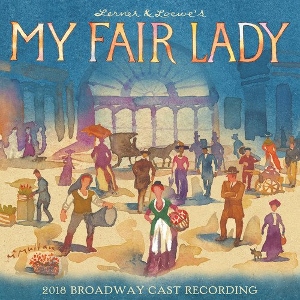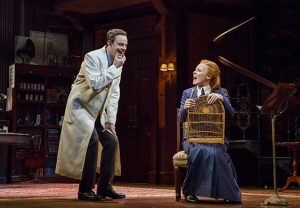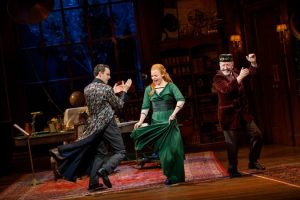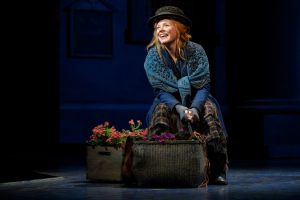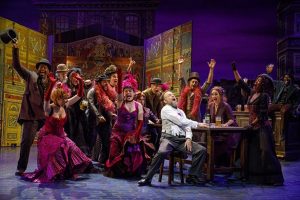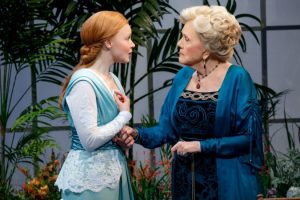BETTER THAN FAIR
As musical revivals went from a few nostalgic productions in the 1970s to the ubiquity of resurrections we see today — both from the Golden Age (Porter, Rodgers and Hammerstein) and later (Lloyd Weber, Sondheim) — it wasn’t enough to just present them as written. Guys and Dolls (1992, with Nathan Lane), How to Succeed in Business Without Really Trying (1995, with Matthew Broderick), The Music Man (2000, with Craig Bierko), Kiss Me, Kate (2000, with Brian Stokes Mitchell), and many more decided to make the original orchestrations snazzier, but the results were often not better than the original, ending up as pastiches of the great orchestrators of Broadway’s heyday. Additionally, many contemporary Broadway singers — while certainly professional belters — lack the vocal distinction of Broadway past.
Which leads to the 2018 recording of Bartlett Sher’s revival of My Fair Lady, the tale of Henry Higgins, a puffed-up upper-class grammarian, and Eliza Doolittle, his lower-class, flower girl protégée whom Higgins turns into a lady by changing her speech. Lerner and Loewe’s unimprovable score from 1956 remains one of the greatest triumphs of teh American Musical Theater. Taped over 60 years ago in mono, the indelible original cast recording with Rex Harrison — who perfected the art of talk-singing — and a 20-year-old Julie Andrews has never been out of print.
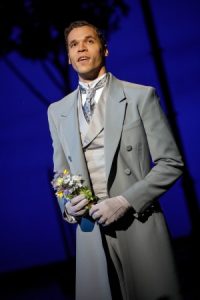 It is perhaps unfair to compare the two recordings, and yet it is impossible not to with an iconic score such as My Fair Lady. This traditional recording on Broadway Records is a fair match for the 1956 version in some ways, not as good at times, and actually surpasses it in others (blasphemy, I know).
It is perhaps unfair to compare the two recordings, and yet it is impossible not to with an iconic score such as My Fair Lady. This traditional recording on Broadway Records is a fair match for the 1956 version in some ways, not as good at times, and actually surpasses it in others (blasphemy, I know).
It’s a delight to hear Loewe’s lush score and the original orchestrations of Robert Russell Bennett and Philip J. Lang performed by the full orchestra with personality, meticulousness, and thoughtful urgency — thanks to Music Director Ted Sperling, whose liner notes let us know he uses the same-sized orchestra as that of 1956 — talk about a rarity in today’s theater! Although it’s curious to delete “Eliza’s Entrance” before the Embassy Waltz, it’s great to hear material that didn’t fit on the original album’s time constraints, such as “The Flower Market,” the “Embassy Waltz” itself, and dance arrangements by Trude Rittman. (Rittman [1908-2005], who created a two-piano version of My Fair Lady, not only worked on some of the greatest musicals of all time, she composed the ballet “Small House of Uncle Thomas” for The King and I [1951] and devised the extended vocal sequence for “Do-Re-Mi” in The Sound of Music [1959]).
As Henry, Harry Hadden-Patten goes so far out of his way to avoid the vocal mannerisms of Harrison that he downplays the acidic, infantile, irascible, petulant qualities that brought so much irony and humor to the original. He also nearly completely abandons the sprechgesang — that style of talking in tone also known as parlando — singing instead Higgins’ “I’m an Ordinary Man,” “A Hymn to Him,” and “Why Can’t the English?” He absolutely nails the dismissive English gentleman, and is most expressive on “I’ve Grown Accustomed to Her Face,” but Rex remains the rex.
Lauren Ambrose is frankly a bit of a revelation here. The erstwhile actress of Six Feet Under had been slated to play Fanny Brice in a postponed revival of Funny Girl, and has sung torch-style tunes with her band, The Leisure Class, so I assumed she was clearly not up for being a leading actress in a musical. With a magnificent, communicative, and silvery-but-earthy soprano, she is truthful to the music while adding a layer of circumstantial undertow and veritas to each of her songs: “Wouldn’t It Be Loverly” is filled with soft yearning, while “I Could Have Danced All Night” exposes a girl lightheaded with the pleasure of education.
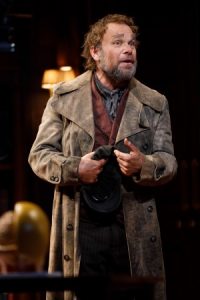 Yet it is Norbert Leo Butz who has truly reinterpreted the role of Eliza’s dustman dad, Alfred. With a rawness and delightful droll music-hall bluster, Butz makes “With a Little Bit of Luck” and “Get Me To The Church On Time” sound fresh, zany, and full of life. And as Freddy, the excited youngster with a crush on Eliza, Jordan Donica has a thrilling voice with lovely old-school vibrato in the oft-covered standard “On the Street Where You Live.”
Yet it is Norbert Leo Butz who has truly reinterpreted the role of Eliza’s dustman dad, Alfred. With a rawness and delightful droll music-hall bluster, Butz makes “With a Little Bit of Luck” and “Get Me To The Church On Time” sound fresh, zany, and full of life. And as Freddy, the excited youngster with a crush on Eliza, Jordan Donica has a thrilling voice with lovely old-school vibrato in the oft-covered standard “On the Street Where You Live.”
Reams have and will continue to be written about other aspects that made My Fair Lady one of the most successful musicals in history, but nothing compares with being enveloped by the sheer genius of it all. In our modern world in which communication is relegated to 140 characters — and even newspapers have typos — My Fair Lady is a reminder of the glorious mysticism and power of human speech. In my mind, this makes it a perfect show for teens and young adults who, even if they don’t use speech properly, know immediately how exciting great songs are when the are rife with literature. Buy them this CD.
photos of the 2018 Broadway cast by Joan Marcus
My Fair Lady
2018 Broadway Cast Recording
Lincoln Center Theater on Broadway Records
19 tracks | 65:18
released June 8, 2018
available on iTunes and Amazon
